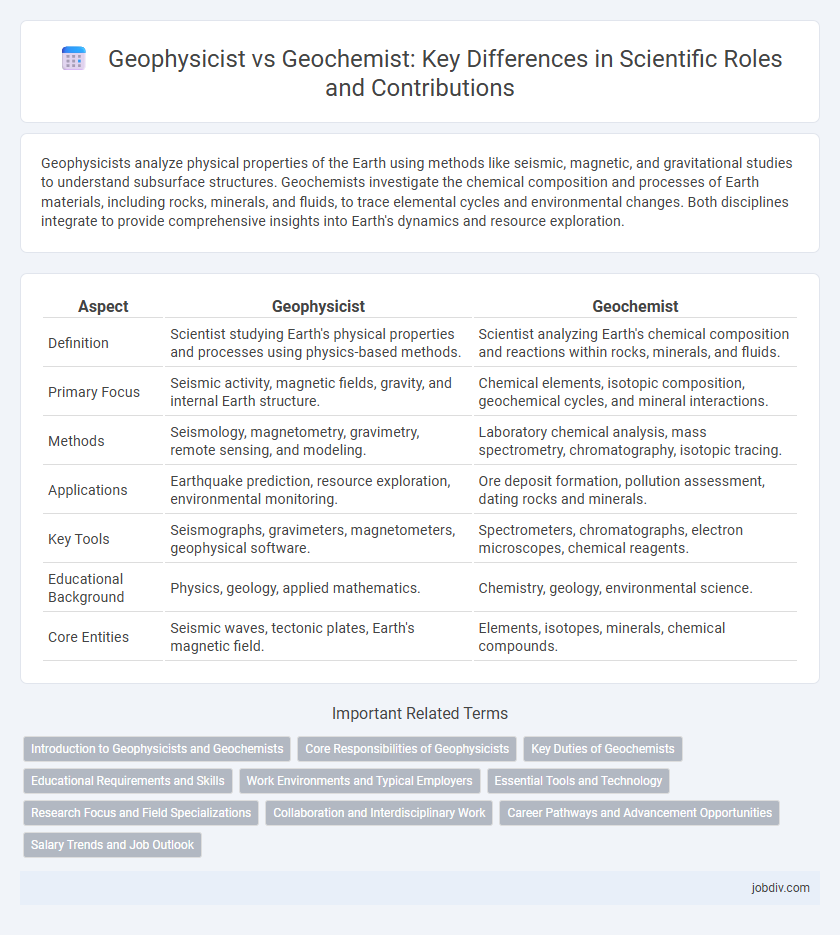Geophysicists analyze physical properties of the Earth using methods like seismic, magnetic, and gravitational studies to understand subsurface structures. Geochemists investigate the chemical composition and processes of Earth materials, including rocks, minerals, and fluids, to trace elemental cycles and environmental changes. Both disciplines integrate to provide comprehensive insights into Earth's dynamics and resource exploration.
Table of Comparison
| Aspect | Geophysicist | Geochemist |
|---|---|---|
| Definition | Scientist studying Earth's physical properties and processes using physics-based methods. | Scientist analyzing Earth's chemical composition and reactions within rocks, minerals, and fluids. |
| Primary Focus | Seismic activity, magnetic fields, gravity, and internal Earth structure. | Chemical elements, isotopic composition, geochemical cycles, and mineral interactions. |
| Methods | Seismology, magnetometry, gravimetry, remote sensing, and modeling. | Laboratory chemical analysis, mass spectrometry, chromatography, isotopic tracing. |
| Applications | Earthquake prediction, resource exploration, environmental monitoring. | Ore deposit formation, pollution assessment, dating rocks and minerals. |
| Key Tools | Seismographs, gravimeters, magnetometers, geophysical software. | Spectrometers, chromatographs, electron microscopes, chemical reagents. |
| Educational Background | Physics, geology, applied mathematics. | Chemistry, geology, environmental science. |
| Core Entities | Seismic waves, tectonic plates, Earth's magnetic field. | Elements, isotopes, minerals, chemical compounds. |
Introduction to Geophysicists and Geochemists
Geophysicists study the physical properties of the Earth using techniques such as seismic, gravitational, and magnetic analysis to understand geological structures and processes. Geochemists analyze the chemical composition of Earth materials, including rocks, minerals, and fluids, to investigate Earth's chemical cycles and environmental changes. Both scientists apply interdisciplinary methods to explore Earth's composition and dynamic systems, with geophysicists focusing on physical phenomena and geochemists emphasizing chemical interactions.
Core Responsibilities of Geophysicists
Geophysicists specialize in studying Earth's physical properties by analyzing seismic waves, magnetic fields, and gravitational data to understand subsurface structures, often aiding in resource exploration and natural hazard assessment. They employ techniques such as seismic reflection, electromagnetics, and well logging to interpret geophysical data for applications in oil and gas, mineral exploration, and environmental monitoring. Their core responsibilities include conducting field surveys, processing geophysical data, and modeling Earth's interior to support geological and engineering decisions.
Key Duties of Geochemists
Geochemists analyze the chemical composition of earth materials to understand geological processes and environmental changes. They collect and interpret data from rock, mineral, soil, and water samples to assess contamination levels and mineral deposits. Their work supports resource exploration, environmental protection, and climate studies by integrating chemistry with geology.
Educational Requirements and Skills
Geophysicists typically require a bachelor's degree in geophysics, physics, or earth sciences, often supplemented by a master's or doctoral degree specializing in seismic data analysis, magnetometry, or gravitational studies. Geochemists usually hold degrees in chemistry, geology, or earth sciences with advanced knowledge in isotope geochemistry, elemental analysis, and laboratory techniques such as mass spectrometry. Both careers demand strong analytical skills, proficiency in data modeling software, and a solid foundation in physics and chemistry principles.
Work Environments and Typical Employers
Geophysicists primarily work in environments such as research institutions, oil and gas companies, and government agencies focused on natural resource exploration and earthquake monitoring. Geochemists are often employed by environmental consulting firms, mining companies, and academic laboratories where they analyze chemical compositions of earth materials to assess pollution or mineral deposits. Both professionals may also collaborate with universities and geological surveys, but geophysicists tend to focus on physical data collection whereas geochemists specialize in chemical analysis.
Essential Tools and Technology
Geophysicists utilize seismic imaging, magnetometers, and ground-penetrating radar to analyze Earth's physical properties and subsurface structures. Geochemists rely on mass spectrometers, X-ray fluorescence (XRF) analyzers, and chromatography techniques to study the chemical composition and processes of minerals and rocks. Both professions integrate GPS technology and remote sensing tools for precise data collection and spatial analysis in geoscientific research.
Research Focus and Field Specializations
Geophysicists primarily investigate Earth's physical properties, such as seismic activity, gravitational forces, and magnetic fields, using techniques like seismic tomography and magnetometry for studies in tectonics and geodynamics. Geochemists focus on the chemical composition, processes, and cycles within Earth's crust, oceans, and atmosphere, employing isotope geochemistry and elemental analysis to understand mineral formation, environmental contamination, and biogeochemical cycles. While geophysics emphasizes quantitative physical measurements of Earth's structure, geochemistry concentrates on chemical interactions and material transformations in various environmental and geological contexts.
Collaboration and Interdisciplinary Work
Geophysicists and geochemists collaborate by integrating seismic, magnetic, and gravitational data with chemical analyses of rock and soil samples to provide comprehensive insights into Earth's subsurface structures and processes. Their interdisciplinary work enables enhanced exploration of natural resources, earthquake risk assessment, and environmental monitoring by combining physical measurements with geochemical signatures. This synergy advances the understanding of geological phenomena through the fusion of geophysical techniques and geochemical data interpretation.
Career Pathways and Advancement Opportunities
Geophysicists typically engage in subsurface mapping and seismic data analysis, advancing through roles in research, oil and gas exploration, or environmental consulting, often requiring strong foundations in physics and mathematics. Geochemists focus on chemical processes of Earth's components, progressing in careers related to mineral exploration, pollution control, or geochemical modeling, emphasizing expertise in chemistry and environmental science. Both career pathways offer opportunities for specialization, leadership in technical projects, and advancement into academic or industry-specific management roles based on experience and advanced degrees.
Salary Trends and Job Outlook
Geophysicists typically earn median salaries ranging from $85,000 to $115,000 annually, influenced by experience and sector, with job growth projected at around 6% through 2030 due to energy exploration and environmental monitoring demands. Geochemists command slightly lower median salaries, generally between $70,000 and $100,000, with a job outlook growth rate near 5%, driven by increasing need for environmental assessments and resource extraction. Both professions benefit from advancements in technology and rising emphasis on sustainable practices, which continue to shape salary trends and employment opportunities within earth sciences.
Geophysicist vs Geochemist Infographic

 jobdiv.com
jobdiv.com